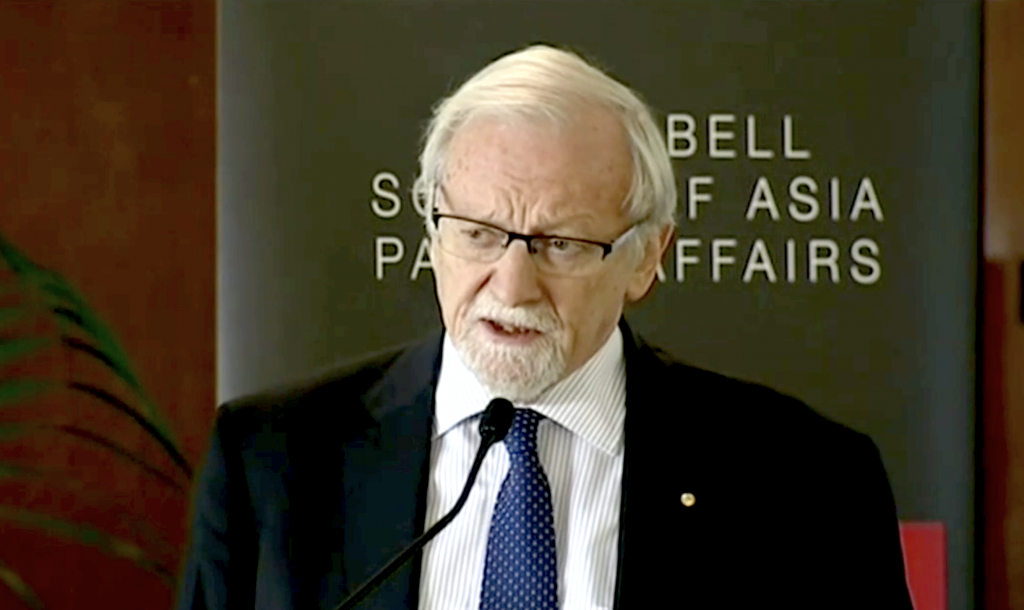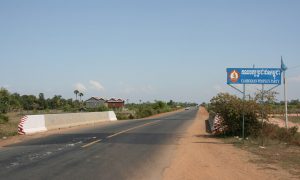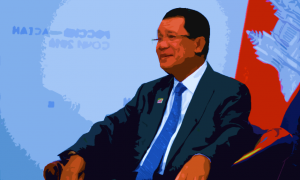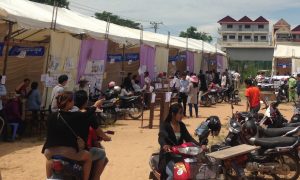On 9 March, the ANU played host to Cambodia on the Brink, a public conference at which scholars, activists, and political leaders assessed where Cambodian politics are headed after Hun Sen’s recent crackdown. We were pleased to have the ANU’s Chancellor, Prof the Hon Gareth Evans, deliver the opening remarks at this forum. As Australia’s Minister for Foreign Affairs (1988–1996), Prof Evans played a central role in establishing the UN peace plan for Cambodia, and has remained outspoken on matters of democracy and human rights in Cambodia in the years since. You can read the text of his speech below. As always, we welcome (intelligent and respectful) responses and debate in the comments field. — Liam Gammon, Editor
PROF EVANS: Many of us here will remember the euphoria we felt in May 1993 when, defying the threats and fears of Khmer Rouge bomb attacks on the polling stations, ordinary Cambodians—men, women, children, whole extended families from grannies to babies—lined up at the polling stations in their scores of thousands, fully understanding the risk of violence, but absolutely thrilled at the prospect of peace at last, and the chance to have some say at last in how they lived their lives.
It was certainly one of the proudest moments of my own life. The negotiation of the Peace settlement, formalised in the 1991 Paris Peace Accords, had been something to which Australia made a major contribution. We developed the core idea of an unprecedentedly central role for the United Nations in the transition process—thus giving a face-saving way for China to withdraw its support for the Khmer Rouge, which proved to be the crucial circuit breaker. And we worked hand in glove with Indonesia to draft all the key elements of the final plan, and to ensure its ultimate diplomatic acceptance by all the key national, regional and global players.
When it was finally implemented the UN peace plan did—albeit with some bumps along the way—unquestionably achieve its principal peacemaking aims. It brought to an end a terrible two decades of suffering by the Cambodian people in which the country had been ravaged successively by massive United States bombing during the Vietnam war, by civil war, by a genocidal reign of terror by the Khmer Rouge exceeded only by the Nazis, and by invasion and by civil war again, resulting overall in the deaths of some two million people and the destruction of the lives of many more.
It succeeded in removing the Cambodian conflict as a source of regional tension. It enabled Vietnam to enter into much more productive relations regionally and internationally. The more than 365,000 displaced Cambodians from the Thai border were successfully repatriated. The path was cleared for Cambodia to assume its rightful place in the community of nations. And reconstruction could at last begin. Those gains have all held, and in the years since Cambodia has trodden a for the most part steady path to greater economic prosperity—albeit with a great deal of help from China, and accompanied by staggering levels of corruption in high places.
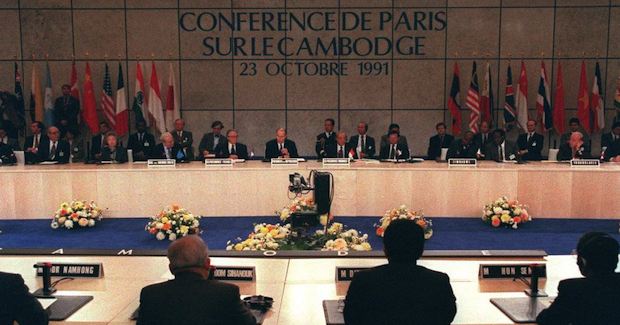
The Paris Conference on Cambodia, October 1991. (Photo: via Australian Institute for International Affairs)
What, unhappily, we did not succeed in achieving 25 years ago, despite all our hopes, was putting Cambodia on a path to true democracy and respect for human rights. The writing was on the wall in the immediate aftermath of the 1993 election. The clear winner in was, to most people’s surprise, Sihanouk’s party, with Hun Sen’s party coming second, but Hun Sen absolutely refused to accept this, and an uneasy power-sharing arrangement was eventually adopted. This was a foretaste of things to come, with Hun Sen ever since resisting—with violence as necessary—any serious challenge to his party’s authority, and human rights generally faring no better.
In 1997 a grenade attack on an opposition rally led by Sam Rainsy in March 1997 killed 16 people and injured more than a hundred. That July, after an uneasy period of sharing power with Prince Norodom Ranariddh’s royalist party, Hun Sen launched a bloody coup in which his opponents were exiled, arrested, tortured, and in some cases summarily executed.
Neither episode generated much international reaction: Hun Sen still had enough political capital from his fight against the Khmer Rouge and his cooperative role in the peace process, while Sam Rainsy was regarded as erratic and rather tarnished by his extreme antipathy to Cambodians of Vietnamese origin, and the royalist leadership was seen—rightly—as feckless. Cambodia-fatigue among policymakers also played a role. At the time, I wanted to believe that these reverses would be temporary, and there were too many like me.
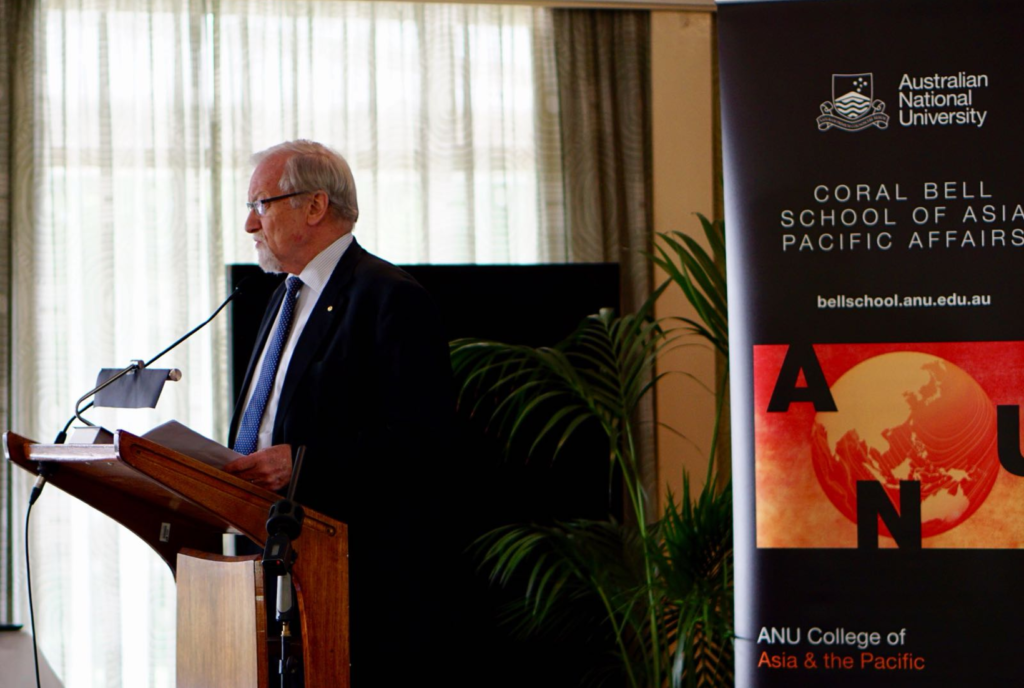
Prof Gareth Evans speaking in Canberra on 9 March (Photo: New Mandala)
But things got no better in the years that followed, and by early 2014, I could hold my own tongue no longer. In the aftermath of yet more deadly violence against unarmed demonstrators protesting the previous year’s deeply flawed national election, and the shooting dead in Phnom Penh of five striking garment workers while peacefully demanding a minimum liveable wage, I wrote a globally syndicated opinion piece saying, in so many words:
Cambodia’s government has been getting away with murder. Not the kind of genocidal slaughter conducted by the Khmer Rouge in the 1970s. Nor the scale of killing that has been roiling Syria, or that has put Ukraine, Venezuela, Thailand, and Bangladesh in the global headlines of late. But murder nonetheless, with Cambodian citizens deliberately targeted by their country’s security forces…
I went on to say:
I know Hun Sen and worked well with him in the past. I have resisted strong public criticism until now, because I thought there was hope for both him and his government. But their behavior has now moved beyond the civilized pale. It is time for Cambodia’s political leaders to be named, shamed, investigated, and sanctioned by the international community.
That remains my position today. It has been amply vindicated by subsequent events, culminating over the last two years in, among many other outrages:
—the brazen daylight murder of the prominent political activist Kem Ley
—the shutting down of Cambodia Daily after being hit with an impossibly large tax bill, the closure of more than a dozen independent radio stations, and systematic harassment of other journalists
—the persecution, through legislative constraints and on-the-ground intimidation, of trade unions, environmental and other NGOs and any other channels for organised dissent
—the arrest last September of opposition leader Kem Sokha on a grotesquely trumped-up “treason” charge for a speech he had given in Melbourne talking about taking advice from American experts on how to work political change; and
—most outrageously of all, the use of a compliant Supreme Court last November to ban the main opposition party—the CNRP—and prohibit all of its sitting national assembly members, and a number of other party officials as well from participating in politics for the next five years; with all CNRP seats at all government levels then redistributed to government supporters
As Sam Rainsy said at the National Press Club last month, it is as if in Australia the Coalition Government were to suddenly and arbitrarily dissolve the Labor Party, arrest and jail Bill Shorten, and then organise a new election without any challenger to Malcolm Turnbull!
Adding insult to all this injury, we have had the spectacle, in the run-up next week’s Australia-ASEAN Summit and Hun Sen’s visit to Sydney for that purpose, of him threatening to “pursue…and beat up” any protesters who had the temerity to insult him, and saying to the Australian Government at the same time “…If you treat me inappropriately I will hit back and leave shame on your face”.
I have had some interesting personal experience of this kind of intimidation. In 2015, a year after I published my syndicated piece stating—accurately—that “Cambodia’s government has been getting away with murder”, I rather incautiously accepted an invitation to address a big conference in Phnom Penh. A message came from Hun Sen’s people asking me to join him on stage at the opening ceremony. Some of the more naïve among the visitors thought this was a nice gesture of reconciliation, but I knew what was coming, and it came in spades: a withering, brown-glass-eye menacing, finger-pointing denunciation of me and all my works, which went on for some fifteen minutes. While this tirade was deeply alarming for the international participants, the umpteen Cambodian cabinet ministers and officials gathered for the occasion remained supremely indifferent and untroubled. As was I. We had heard it all before.
The trouble is, of course, that while there was not much harm Hun Sen could do to me, that is absolutely not the case for Cambodians living under his autocratic rule; or for expatriates living in Cambodia like the jailed Australian film-maker James Ricketson; and perhaps also for diaspora Cambodians, who fear the cruel reach of his arm in other ways.
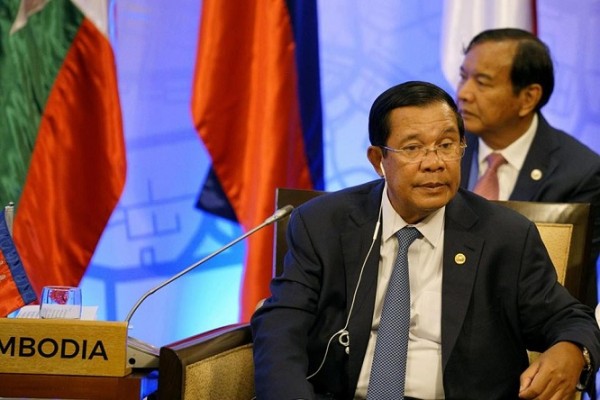
Hun Sen at the 2017 ASEAN Summit in Manila. (Photo: Agence Kampuchea Press)
While the disintegration of even a pretence of human-rights-respecting democracy in Cambodia has been generating an increasing amount of international media attention in recent times, the reaction of governments around the region and the wider world has been impossibly limp. With Australia no exception—not surprising given the government anxiety not to rock any boats in the lead up to next week’s summit, and above all to try to keep alive its manifestly indefensible, as well as unworkable, Cambodian refugee-dumping program. There has been a handful of very cautious expressions of concern at the time of the most egregious misbehaviour—the dissolution of the opposition—and a few implausible assurances that appropriately stern messages are being privately given through diplomatic channels. But that has been about it.
It is a tough call in the present regional and wider international environment to identify credible strategies to pull Cambodia back from the brink on which it is indeed now precariously balanced. But this conference, with the experts and activists that Nicholas Farrelly and his team here at ANU have assembled, is a very timely opportunity to review and document just how far the rot has spread, and to at least begin the task of mapping a path back to decency—so that Cambodia will in fact at last become the country we all wanted it to be when, 25 years ago, we finally put to rest the ravages of genocide and civil war.
[END]
 Facebook
Facebook  Twitter
Twitter  Soundcloud
Soundcloud  Youtube
Youtube  Rss
Rss 